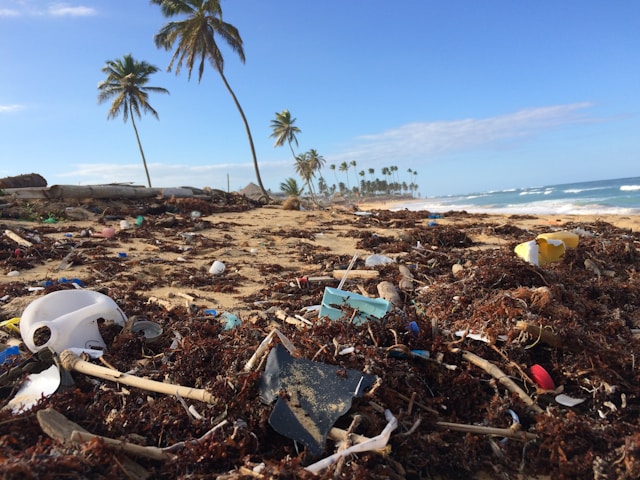Managing debris is a critical aspect of maintaining clean and sustainable environments, especially in urban settings and after natural disasters.
However, the methods used for debris removal can have significant environmental impacts. This guide explores various debris removal solutions and provides best practices to ensure minimal environmental disruption.
Waste Generation
Waste generation is a major problem for our planet. Every day, people produce large amounts of waste from homes, businesses, and farms. This waste includes plastic, food scraps, and more. When it piles up, it can harm the environment. It can also lead to pollution, which affects our air and water.
Proper waste management is important to tackle this issue. It means managing waste so it can be reduced, reused, or recycled. By sorting our waste and using bins correctly, we can help the earth. Together, we can minimize waste generation and protect our environment.
Air Pollution
Air pollution is a serious problem that affects everyone. It occurs when harmful substances enter the air we breathe. These substances can come from cars, factories, and even wildfires. When air is polluted, it can cause health issues. People may experience breathing problems, allergies, or other illnesses.
Reducing air pollution is very important. We can all help by using public transport, walking, or biking instead of driving. Planting trees can also improve air quality. Trees absorb carbon dioxide and provide oxygen. By making small changes in our daily lives, we can reduce air pollution and protect our health.
Water Contamination
Water contamination is a big problem for our health and the environment. It happens when harmful substances mix with water. These substances can come from industrial waste, agricultural runoff, and even sewage. Contaminated water can also harm plants and animals that depend on clean water to survive.
To prevent water contamination, we must take action. One way is to properly dispose of waste and chemicals. People should never dump toxic substances down the drain. By being careful about what we put in our water, we can help keep it clean. Together, we can ensure that everyone has access to safe and clean water.
Habitat Destruction
Habitat destruction is a major issue facing our planet today. It occurs when natural environments are altered or destroyed. This can happen due to urban development, agriculture, and logging. As habitats disappear, animals lose their homes and food sources. This leads to a decline in wildlife populations.
Proper waste management can help combat habitat destruction. By managing waste effectively, we can reduce the need for new landfill sites. We must protect forests, wetlands, and other vital ecosystems. Together, we can work towards a healthier environment for all living things.
Energy Consumption
Energy consumption is a big concern in today’s world. We use energy in our homes, businesses, and factories. It can also harm the environment. By being mindful of how we use energy, we can make a positive impact. Reducing energy waste is important for a clean future.
Concrete debris handling is part of this effort. Recycling concrete can reduce the need for new materials. This process uses less energy compared to creating new concrete from scratch. By focusing on efficient concrete debris handling, protecting our planet, and conserving resources.
Noise Pollution
Noise pollution is an often overlooked issue that affects many people. It happens when loud sounds disrupt our environment. This noise can lead to stress, sleep problems, and hearing loss. It impacts our daily lives and can harm wildlife as well. Animals depend on sounds for communication and survival.
Finding a debris removal solution can help reduce noise pollution. By ensuring that construction and cleanup activities are managed more carefully, we can limit the amount of noise they produce. Communities can also create green spaces to serve as buffers against noise.
Soil Degradation
Soil degradation is a serious problem that affects our land and food supply. It occurs when soil loses its nutrients and structure. This can happen due to over-farming, deforestation, and pollution. This can lead to lower yields and food shortages. Protecting our soil is essential for a healthy environment.
One way to combat soil degradation is by using effective concrete removal techniques. These techniques can help reduce the amount of debris that ends up in landfills. When concrete is recycled properly, it keeps soil clean and prevents contamination. Together, we can work to restore and protect our precious soils.
Chemical Pollution
Chemical pollution is a major threat to our environment. It happens when harmful chemicals enter our soil and water. When they combine with natural resources, they can cause serious damage. Clean air and water are essential for living things. Reducing chemical pollution is crucial to keep our environment safe.
One effective way to combat this problem is through concrete cleanup strategies. These strategies focus on reducing the impact of construction waste. Cleaning up concrete debris prevents harmful chemicals from leaking into the ground. This helps protect our soil and water from contamination.
Greenhouse Gas Emissions
Greenhouse gas emissions are a major cause of climate change. They come from many sources, such as cars, factories, and power plants. When we burn fossil fuels, we release carbon dioxide and other harmful gases. Reducing these emissions is important for a healthier planet.
One effective way to help is through safe concrete debris disposal. By managing concrete waste, we can lower the amount of harmful gases released. Recycling concrete reduces the need for new materials and cuts down on emissions.
Resource Depletion
Resource depletion is a growing problem in our world. Over time, this affects the environment and can lead to shortages. We need these resources for many aspects of our lives. When they are gone, it can harm our communities and economy.
Junk removal plays a key role in helping reduce resource depletion. This practice lessens the need for new materials and conserves what we already have. Proper junk removal helps protect the environment. Together, we can make a positive impact through responsible junk removal.
Learn All About Debris Removal Solution
In conclusion, addressing environmental issues through effective debris removal solutions is essential for creating a sustainable future. By managing waste, reducing pollution, and conserving resources, communities can promote a healthier environment.
It is important for everyone to participate in these efforts. Together, positive change can be achieved for the planet and future generations.
Did you find this article helpful? Check out the rest of our blog for more!




